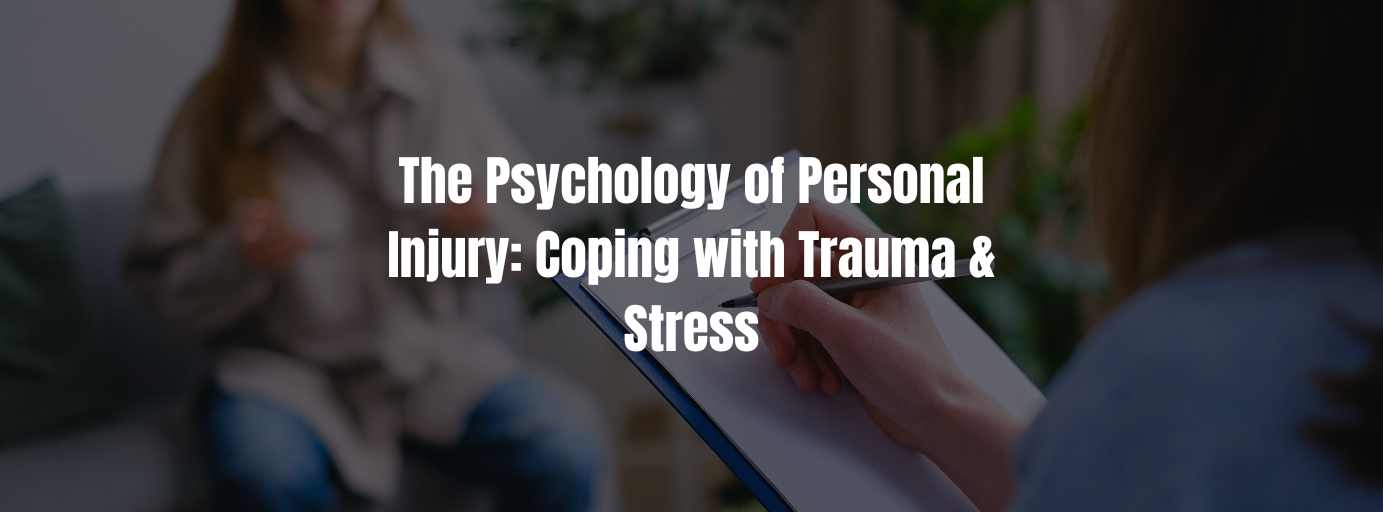Introduction
Personal injuries can be life-altering events that leave emotional scars as debilitating as the physical ones. While the physical recovery process is often the primary focus, coping with the psychological trauma and stress that frequently accompanies personal injuries is crucial for a full recovery. This article delves into the psychological toll of personal injuries and provides strategies for coping with trauma, stress, and the emotional challenges that arise.
Understanding the Psychological Toll of Personal Injuries
A personal injury can trigger a range of emotional responses, including shock, anger, anxiety, and depression. The physical pain and limitations can exacerbate these emotional struggles, creating a vicious cycle that impedes healing. Common psychological challenges faced by injury victims include:
- Post-Traumatic Stress Disorder (PTSD): Reliving the traumatic event through intrusive thoughts, nightmares, or flashbacks.
- Loss of Independence: Feeling helpless or dependent on others for daily activities can be demoralizing.
- Fear and Anxiety: Apprehension about the future, fear of re-injury, or anxiety related to medical procedures or treatments.
- Self-Esteem Issues: Negative body image, feeling “broken” or diminished self-worth due to physical limitations.
Recognizing and addressing these psychological effects is crucial, as they can significantly impact recovery and overall well-being.
Strategies for Coping with Trauma and Stress
Coping with the trauma and stress of a personal injury requires a multi-faceted approach. Here are some effective strategies:
- Seek Professional Help
Therapists and counselors trained in trauma-focused therapy can provide invaluable support and guidance.
Support groups connect individuals with others who have had similar experiences, fostering a sense of community and shared understanding.
- Practice Self-Care
Mindfulness and relaxation techniques, such as deep breathing exercises, meditation, and yoga, can reduce stress and promote emotional well-being.
Regular exercise, within the limitations of the injury, can improve physical and mental health.
- Build a Support System
Lean on family and friends for emotional support, practical assistance, and encouragement.
Online communities and forums can provide a sense of connection and shared experiences.
- Journaling and Emotional Outlets
Writing about thoughts and feelings can be a cathartic release and aid in processing emotions.
Creative pursuits like art, music, or poetry can serve as healthy emotional outlets.
- Cognitive-Behavioral Therapy (CBT) and Other Evidence-Based Approaches
CBT helps identify and challenge negative thought patterns, promoting more adaptive coping strategies.
Other therapies, such as Eye Movement Desensitization and Reprocessing (EMDR), can effectively treat trauma-related disorders.
The Role of Resilience in Recovery
Resilience, the ability to bounce back from adversity, plays a crucial role in recovery from personal injury. Cultivating a growth mindset and reframing negative thought patterns can foster resilience. For example, instead of thinking, “I’ll never be the same again,” try reframing it as, “This is an opportunity for growth and adaptation.”
Finding meaning and purpose in the recovery journey can also fuel resilience. Celebrating small victories and progress, no matter how incremental, can reinforce a sense of accomplishment and motivation.
“Resilience is not what happens to us, but how we respond to what happens to us.”
Dr. Gregory Jantz

Managing Stress and Anxiety
Stress and anxiety are common companions to personal injury, often exacerbating physical pain and hindering recovery. Recognizing the signs of stress and anxiety, such as irritability, muscle tension, or difficulty concentrating, is the first step in managing them effectively.
Stress management techniques can include:
- Deep Breathing Exercises: Inhaling deeply through the nose and exhaling slowly through the mouth can induce a calming effect.
- Meditation: Focusing on the present moment and letting go of intrusive thoughts can reduce anxiety and improve emotional regulation.
- Yoga: Combining physical postures, breathing exercises, and meditation can promote relaxation and mindfulness.
Additionally, self-compassion and patience are essential in the healing process. Setbacks and triggers may occur, but acknowledging and accepting them without judgment can help prevent a downward spiral of negative emotions.
Rebuilding Confidence and Self-Esteem
Personal injuries can significantly impact self-image and self-worth, as individuals grapple with physical limitations, scarring, or changes to their appearance. Rebuilding confidence and self-esteem is a crucial part of the recovery journey.
Strategies for regaining confidence include:
- Goal-Setting: Setting achievable goals, whether related to physical therapy, daily tasks, or hobbies, can foster a sense of accomplishment and progress.
- Positive Self-Talk: Countering negative self-talk with affirmations and self-compassionate statements can gradually reshape self-perception.
- Embracing a New Normal: Redefining success and accepting the changes brought about by the injury can promote self-acceptance and resilience.
Finding purpose and meaning in the recovery journey can also bolster self-esteem. Whether it’s exploring new hobbies, volunteering, or advocating for others with similar experiences, engaging in meaningful activities can instill a sense of pride and self-worth.
The Role of Family and Friends in Recovery
A strong support system is invaluable in the recovery process. Family and friends can provide emotional support, practical assistance, and a sense of normalcy amidst the challenges of personal injury.
Effective communication is key to leveraging this support system. Injury victims should feel empowered to express their needs and set boundaries, while loved ones should strive to listen without judgement and offer help without unsolicited advice.
Dealing with insensitive comments or unsolicited advice can be challenging, but setting clear boundaries and educating others on the complexities of personal injury recovery can help mitigate these situations.
Maintaining healthy relationships during the recovery process is also crucial. Injury victims may need to adjust expectations and find new ways to connect with loved ones, fostering understanding and empathy on both sides.
Coping with Grief and Loss
Personal injuries often involve a sense of grief and loss – the loss of physical function, independence, dreams, or even a sense of self. Acknowledging and processing this grief is essential for emotional healing.
The stages of grief (denial, anger, bargaining, depression, and acceptance) may manifest in various ways, and their impact on recovery should not be underestimated. Seeking professional support, such as grief counseling or support groups, can be invaluable for navigating complicated grief.
Ultimately, finding acceptance and moving forward requires a willingness to embrace a new normal. This process is unique to each individual, but with time, patience, and support, it is possible to find meaning and purpose in the midst of loss.
“Grief is like the ocean; it comes on waves ebbing and flowing. Sometimes the water is calm, and sometimes it is overwhelming. All we can do is learn to swim.”
Vicki Harrison
Conclusion
Get the Support You Need
Coping with the psychological trauma and stress that accompany personal injuries is a complex and multifaceted journey. A holistic approach that addresses the emotional, cognitive, and social aspects of recovery is essential.
Cultivating resilience, self-compassion, and a strong support system can provide the foundation for emotional healing. Seeking professional help, practicing self-care, and embracing evidence-based approaches can equip individuals with the tools to navigate the challenges of personal injury recovery.
Remember, recovery is a process, and setbacks are a natural part of the journey. By acknowledging and addressing the psychological toll of personal injuries, individuals can emerge stronger, more resilient, and better equipped to face life’s challenges with renewed confidence and purpose.
Trusted Legal Guidance | Claim Settlement
Turn to our experienced network of personal injury lawyers at Claim Settlement for assistance. Our team of legal experts boasts over 30 years of collective experience in successfully handling personal injury and accident cases, securing millions of dollars in settlements for our clients. Benefit from our complimentary initial consultations, and rest assured, you won’t incur any fees until our network of lawyers has secured the compensation you rightfully deserve. If you’ve suffered an injury or been involved in an accident, reach out to us at 1-833-892-5246 for a no-obligation consultation, or email us at claim@claimsettlement.ca.
FAQ
[sp_easyaccordion id=”3124″]
